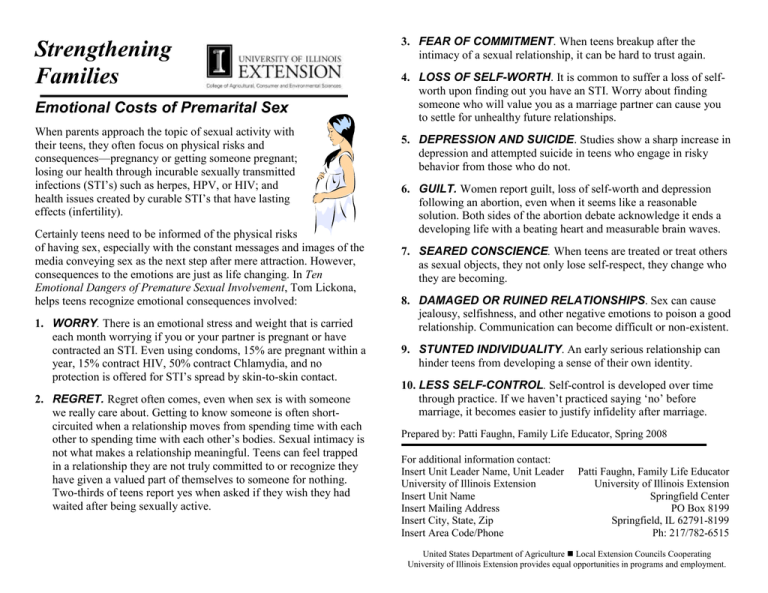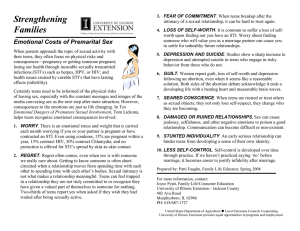
Strengthening
Families
Emotional Costs of Premarital Sex
When parents approach the topic of sexual activity with
their teens, they often focus on physical risks and
consequences—pregnancy or getting someone pregnant;
losing our health through incurable sexually transmitted
infections (STI’s) such as herpes, HPV, or HIV; and
health issues created by curable STI’s that have lasting
effects (infertility).
Certainly teens need to be informed of the physical risks
of having sex, especially with the constant messages and images of the
media conveying sex as the next step after mere attraction. However,
consequences to the emotions are just as life changing. In Ten
Emotional Dangers of Premature Sexual Involvement, Tom Lickona,
helps teens recognize emotional consequences involved:
1. WORRY. There is an emotional stress and weight that is carried
each month worrying if you or your partner is pregnant or have
contracted an STI. Even using condoms, 15% are pregnant within a
year, 15% contract HIV, 50% contract Chlamydia, and no
protection is offered for STI’s spread by skin-to-skin contact.
2. REGRET. Regret often comes, even when sex is with someone
we really care about. Getting to know someone is often shortcircuited when a relationship moves from spending time with each
other to spending time with each other’s bodies. Sexual intimacy is
not what makes a relationship meaningful. Teens can feel trapped
in a relationship they are not truly committed to or recognize they
have given a valued part of themselves to someone for nothing.
Two-thirds of teens report yes when asked if they wish they had
waited after being sexually active.
3. FEAR OF COMMITMENT. When teens breakup after the
intimacy of a sexual relationship, it can be hard to trust again.
4. LOSS OF SELF-WORTH. It is common to suffer a loss of selfworth upon finding out you have an STI. Worry about finding
someone who will value you as a marriage partner can cause you
to settle for unhealthy future relationships.
5. DEPRESSION AND SUICIDE. Studies show a sharp increase in
depression and attempted suicide in teens who engage in risky
behavior from those who do not.
6. GUILT. Women report guilt, loss of self-worth and depression
following an abortion, even when it seems like a reasonable
solution. Both sides of the abortion debate acknowledge it ends a
developing life with a beating heart and measurable brain waves.
7. SEARED CONSCIENCE. When teens are treated or treat others
as sexual objects, they not only lose self-respect, they change who
they are becoming.
8. DAMAGED OR RUINED RELATIONSHIPS. Sex can cause
jealousy, selfishness, and other negative emotions to poison a good
relationship. Communication can become difficult or non-existent.
9. STUNTED INDIVIDUALITY. An early serious relationship can
hinder teens from developing a sense of their own identity.
10. LESS SELF-CONTROL. Self-control is developed over time
through practice. If we haven’t practiced saying ‘no’ before
marriage, it becomes easier to justify infidelity after marriage.
Prepared by: Patti Faughn, Family Life Educator, Spring 2008
For additional information contact:
Insert Unit Leader Name, Unit Leader
University of Illinois Extension
Insert Unit Name
Insert Mailing Address
Insert City, State, Zip
Insert Area Code/Phone
Patti Faughn, Family Life Educator
University of Illinois Extension
Springfield Center
PO Box 8199
Springfield, IL 62791-8199
Ph: 217/782-6515
United States Department of Agriculture Local Extension Councils Cooperating
University of Illinois Extension provides equal opportunities in programs and employment.



